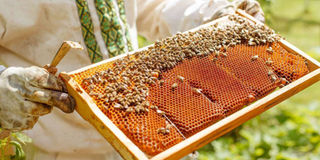Bee aware: Beetles put pollination at risk

Bee keeping. Beetles have been blamed for driving bees out of their hives. PHOTO | FOTOSEARCH
Bees, the small buzzing insects that aid pollination, are at risk. There are more than 20,000 species of them in the world and nearly 17 per cent of these face extinction, a report has shown.
According to the United Nations Environment Programme (Unep), uncontrolled development, environmental pollution and climate change are partly to blame.
A global report by Intergovernmental Science Policy Platform on Biodiversity and Ecosystem Services and Unep, released in 2016, had said farmers had been overusing pesticides on plants.
But, now scientists are raising an alarm about another factor responsible for driving the insects out of the planet: small hive beetles.
An entomologist at National Museums of Kenya, Dr Wanja Kinuthia, told HealthyNation: “This is a very big challenge that will spiral out of control soon.”
PROTECTIVE GEAR
Another bee expert, Mr Samuel Kamau from the Directorate of Veterinary Services at the Ministry of Agriculture, said this is a global problem, which the Kenyan farmer was not aware of because they visited their hives at night.
“Most farmers do not have honey harvesting protective gear and resort to smoking the bees at night to avoid being bitten,” he said, adding that “yet opening the hives during the day is the only way they can tell whether there are beetles and other pests”.
A study published in the journal Nature this month, indicated that international trade in bee wax was to blame for the beetles. The beetles are transported through the wax.
Farmers in Kenya use the wax to form the base structure of the nest. It is also used in the beauty industry, for instance, in hair products.
Kenya holds about 1,000 bees and at any given landscape there could be more than 100 types of bees, according to the book, Our Friends the Pollinators: A Handbook of Pollinator Diversity and Conservation in East Africa.
The bees are responsible for pollinating 75 per cent of the food we eat.
DESTROY NESTS
Research by International Centre of Insect Physiology and Ecology, headquartered in Nairobi, showed the beetles caused severe damage to the honeybee colonies and destroyed the nests.
The beetles, the reports added, fed on larvae, pollen, honey and drove bees from the hives.
“The adult beetles are able to fly several kilometres, hence the risk of rapid spread of infestation,” said the report. “Apart from the speed, they are difficult to pick up because they have a remarkable resemblance to wax moth larvae.”
With the tropical climate in Africa, the beetle requires 38 to 81 days to develop from egg to adult and can produce up to five generations per year under suitable conditions.
Dr Kinuthia said sanitation was the only way to stop beetle spread and trade regulations focusing on the combs, not the wax.
Records show bee research in Kenya is underfunded.



